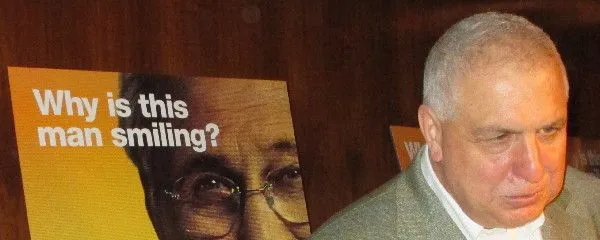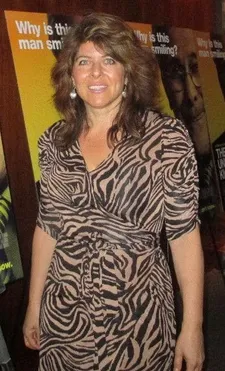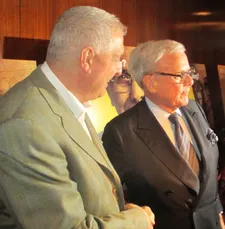 |
| Errol Morris on The Unknown Known: "It could be like Jabberwocky out of Alice In Wonderland and Through The Looking-Glass" Photo: Anne-Katrin Titze |
In New York the snowflakes were falling as Peggy Siegal hosted a perfect evening with Tom Brokaw and Errol Morris in conversation at the Museum of Arts and Design on Columbus Circle followed by dinner at Circo. Among those walking the red carpet before The Unknown Known were Naomi Wolf, Candice Bergen, David Chase, Jamie Colby and 60 Minutes men Morley Safer and Bob Simon.
I had a quick chat with Errol Morris and Naomi Wolf before the screening.
Anne-Katrin Titze: There seems to be some confusion what the Unknown Known really is. Can you give me your definition?
Errol Morris: Have you seen the movie?
AKT: Yes, I have.
EM: At the heart of this movie The Unknown Known is what happens when you have a subject who isn't even aware when he is lying. There is confusion but let's address one other possibility, that it's just nonsense talk. Maybe it means whatever we want it to mean. Maybe it means nothing at all. It could be like Jabberwocky out of Alice in Wonderland and Through the Looking-Glass.
AKT: Rumsfeld on slithy toves?
EM: Yeah.
AKT: What do you think of when you hear Unknown Known?
Naomi Wolf: I haven't seen this film yet. I'm looking forward to it. You mean in general?
AKT: Yes, in this context or in general.
 |
| Naomi Wolf on the unknown known in general: "There's the known which is terrorism and then there's the hype and manipulation of people's fears about the other"
Photo: Anne-Katrin Titze |
Peggy Siegal introduced Tom Brokaw with RADiUS–TWC’s co-founders Tom Quinn and Jason Janego with her on the stage.
Peggy Siegal: I want to thank you from the bottom of my tiny PR heart. Tom [Brokaw] will come up and then Errol will come up and say hello. After the movie we will have a very quick Q&A and then we're going to go to dinner at Circo.
Tom Brokaw: Anybody who believes that Peggy has a teeny PR heart can leave the room right now. First I want to say a few things about my friend Errol. Last time I introduced a film of his to a New York audience was for The Fog Of War and he won an Academy Award. Not that anyone in this audience would not be familiar with Don Rumsfeld but I spent a lot of my adult life studying him, reporting on him, dealing with him. I thought I would share some of my own thoughts. Something you've got to understand about Rumsfeld at the beginning is that he was a champion wrestler in High School, at Princeton and all Navy. He knew all the holds and that really defined his life in so many ways. It is a combative sport after all. It is fatiguing and he took that into any aspect of his life.
He arrived in Washington as a 30-year-old Republican congressman from the North Shore of Chicago. He went to work almost immediately in the Nixon administration on domestic policy and the President admired him but didn't trust his ambition. That was not uncharacteristic of Nixon in those days, obviously, but it was an early-on sign who Donald Rumsfeld was. Rumsfeld got a lucky break. Kissinger and Nixon wanted him out of town. They shipped him off, this is NATO, where he became the American ambassador for two years while Watergate was underway.
He returned to Washington to become Gerald Ford's first White House Chief of Staff, later he became his Secretary of Defense. He was the youngest man to hold that position and then the oldest man to hold that position when he was appointed in this job by President Bush. In these early formative years he stayed close to a young Republican from Wyoming he met in the early days of his commercial career and that was Dick Cheney. As an operative he was smart, tough, wilful and so good at perfecting his turf that he drove Kissinger absolutely nuts.
![Tom Brokaw introducing The Unknown Known: "Tonight, Errol steps into the ring with Rummy [Rumsfeld]"](/images/newsite/Tom_Brokaw_introducing_The_Unknown_Known1_225.webp) |
| Tom Brokaw introducing The Unknown Known: "Tonight, Errol steps into the ring with Rummy [Rumsfeld]" Photo: Anne-Katrin Titze |
EM: I wish I could have Tom at every single screening. The best introduction that I ever had by one of the great journalists of our time. This has been one of the more difficult interviews I've ever done. Perhaps because I made a mistake at the outset. The mistake of thinking that I might find something out or that there might be something to find out. There's a mystery for me at the heart of this film.
After the screening Morris said a few more words about his experiences with his subject.
EM: In so many ways, Rumsfeld was incredibly gracious. He came to Boston five separate times. I had 30 hours of interview material to work with. This is the first time that the "snowflakes" [as Rumsfeld's millions of memos are known] were turned over to the public. He gave me access to almost all the declassified snowflakes. Charming, incredibly well-spoken, and yet I left with this very very strange interview that I'm still very much puzzled by. The strange answers or non answers. The war in Vietnam - "one of the great American nightmares", "a terrible debacle". Saigon is being evacuated, the war is coming to an end, I asked him, What did you learn from Vietnam? And the answer is, "Some things work out, some things don't". "All generalities are false, including this one." Often when I correct him because he said something completely untrue, he basically ignores it or it doesn't seem to register.
 |
| Errol Morris greets Tom Brokaw: "The best introduction that I ever had by one of the great journalists of our time" Photo: Anne-Katrin Titze |
Asked about the difference between former US Secretary of Defense Robert S McNamara, the subject of The Fog of War and Rumsfeld, EM said: My wife made the very best comparison. She called Robert McNamara the Flying Dutchman. A guy who travels the world searching for redemption and never ever finding it. And Donald Rumsfeld she called the Cheshire Cat. As Alice said, "I've often seen a cat without a grin. But I've never ever seen a grin without a cat." And at times, that's what I'm left with - this infernal grin.
Asked if Rumsfeld had seen the film, Morris responded: He has seen four versions of it. As I was editing it, I promised him, even though he had no editorial control. I have been the recipient of many , many, many Rumsfeld snowflakes… I think he liked it, but you would be better off asking him.
On the red carpet earlier, veteran 60 Minutes correspondent Morley Safer tried to clear things up.
 |
| Morley Safer, with a smile: "Unknown! It's unknown. Doubly unknown" Photo: Anne-Katrin Titze |
Morley Safer: Unknown! It's unknown. Doubly unknown.
"The absence of evidence is not evidence of absence" and "stuff happens" are well remembered quotes and show up in the documentary like best-of highlights. Expected and delivered. Rumsfeld's letter of resignation in reaction to the detainee scandal, "Something terrible happened on my watch" - prompts the filmmaker to ask if it hadn't been better not to go there at all. "Time will tell," is his response.
The Unknown Known is out now in cinemas across the UK.





















